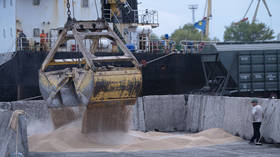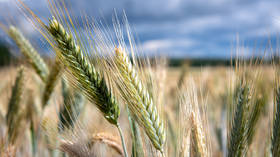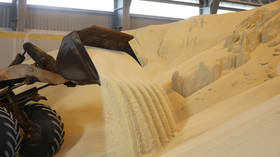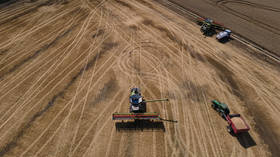The EU has gobbled up Ukrainian grain meant for Africa
The grain deal, intended to solve food crises in poor countries, is only serving to flood European markets

Remember all the talk about how critical it was to get Ukrainian and Russian grain shipped out of the country to feed the hungry in Africa and Asia? Well, it turns out that the EU has used the charity food drive to fill up its own fridge – and all to the net detriment of its own farmers.
While Ukrainian grains are pouring into the EU, Russian grain and fertilizer destined for Africa has been blocked by Western sanctions impacting shipping, insurance, and payments through the SWIFT system from which its Russian Agricultural Bank has been removed. And although only half of the grain deal is actively being executed – however poorly and detrimentally – the United Nations seems unwilling to intervene to rectify its own initiative.
After all the Western pearl-clutching, Russia agreed to a deal last year with the West to ensure exports of both Russian and Ukrainian grain from the region via the Black Sea. But it’s starting to look like all the hand-wringing was just a pretext to get more Ukrainian grain into the EU, with African countries getting just 1-2% each, according to the United Nations data for the Black Sea Grain Initiative.
Until recently, anyone even suggesting that Ukrainian grain was largely heading to the EU was accused of peddling disinformation. As far back as July of 2022, Polish farmers were worried that, because 80% of the grain coming out of Ukraine was going through their country, it risked leaking into the Polish market. But at the time, the Polish Agriculture Minister said that any suggestions of Ukrainian grain ending up on the Polish market were the result of “information chaos and the dissemination of false information.” The harm to Polish farmers turned out to be such very real news that the same agriculture minister has now resigned over the farmes’ ire, and the EU is now tossing real cash to the tune of billions of euros at the problem that they’ve created for themselves.
Leave it to the EU to manage parlaying food hogging into a disaster. Well, for everyone except perhaps Spain, the recipient of 16% of all grain shipments under the deal, which is reportedly using it to increase its production and export of pork by feeding the food destined for humans to Spanish pigs.
Other EU farmers now need bailouts. “This is support for the farmers affected by the increase of imports from Ukraine, not for the consequences of the war,” said EU Agriculture Commissioner Janus Wojciechowski. “We have a ‘reserve’ for the crisis and we used only €56 million for the specific situation.” What a bargain! Only a few tens of billions of euros to fix an entirely self-made problem. Yet another resounding demonstration of competence by the big-brained Brussels bureaucrats.
There have been blatant indications for months that the plan was veering towards disaster. Turkish President Recep Tayyip Erdogan pointed out in January that 44% of Ukrainian grain was ending up in the EU. And with their own grains devalued as a result of their flooded markets, European farmers don’t seem happy about being made unwitting martyrs for Ukraine. They have been pushed out of their own markets in order to keep cash from grain sales flowing to Kiev. “In effect, prices in local/regional markets have dropped causing a significant impact on farmers’ income. The Commission is not reacting swiftly enough. Our members had already flagged the concerns about market disruptions last year,” said Paulo Gouveia, chief policy advisor for the European farmers cooperative, Copa-Cogeca.
Apparently, the farmers just don’t have much of an appreciation for the amount of time it took for Brussels to amass the massive pile of cash required to cushion its policy disaster as it circled back and crash-landed on the EU’s own citizens and economy. Poland, Romania, Bulgaria, Hungary and Slovakia have all sounded the alarm over the impact of the grain glut. “We have proven through statistical data and figures that Hungarian farmers are indeed incurring huge losses because of the grain going through the solidarity lane staying in Hungary instead of reaching its intended destination,” said Hungarian Agriculture Minister Istvan Nagy.
Nagy says that Hungarian farmers have lost up to 37% of their income over the Ukrainian grain, driving down the price of local supply. But the EU initially denied Hungary’s and Slovakia’s requests for assistance and has only more recently considered another round of compensation that includes them. Nagy described the initial choice to exclude them as political, even though Slovakia has since evoked health concerns related to findings of unauthorized pesticides on Ukrainian wheat. And now Brussels is paying lip service to their concerns with another €100 million, which is couch cushion cash for the EU compared to the billions it regularly tosses around.
All this flooding of the EU with Ukrainian grain could have been avoided if it had simply ensured that the grain was used for its stated purpose. Russian President Vlaidmir Putin has been warning all along that the food was being misdirected. “From August 1, 2022, to March 20, 2023, 827 ships left Ukraine, of which only 3 million tonnes of grain were sent to Africa and 1.3 million to the poorest countries in Africa. As I said, almost 45% went to well-fed European countries, despite the fact that this whole deal was presented under the pretext of ensuring the interests of African countries,” Putin underscored at the Russia-Africa Parliamentary Conference in Moscow earlier this year.
Taking matters into their own hands amid persistent supranational incompetence, Poland, Hungary, and Slovakia recently decided to just ban Ukrainian agricultural imports outright. It was surprising to see Ukraine’s number one European cheerleader, Poland, in that mix. Support for Ukraine apparently ended where political jeopardy for Poland’s ruling Law and Justice party began. Polish farmers protesting the impact of the Ukrainian imports on their own livelihood risked becoming a political liability in the Polish general election set for this fall. Not that Poland’s solidarity with its fellow EU farmers lasted very long. It ultimately agreed to lift its Ukrainian grain ban, leaving its neighbors with less leverage to negotiate with Brussels. Surely it’s just a coincidence that the move comes in the wake of the European Parliament’s largest party accusing Poland of siding with Russia along with its fellow ban partners, Hungary and Slovakia.
“European governments must not act in detriment to solidarity for Ukraine during the war. Before unilaterally deciding to block export ways for Ukrainian goods, we need to have detailed information on why this grain or other products were not transited further out of Europe and what is the exact amount of the Ukrainian grain or other products stocked in European warehouses. We also need to know what the requests are of the protesting farmers in the Member States. Any unilateral action by Member States will only be a move in favor of Russia,” said European People’s Party MEP Sandra Kalniete. Ukraine’s Agriculture Ministry also piled on the pressure. “We understand that Polish farmers are facing a difficult situation, but we are emphasizing that now the most difficult situation is for Ukraine’s farmers,” the ministry said.
Apparently Brussels has an endless supply of taxpayer cash to toss at the problems that it creates for itself, bailing out everyone from farmers to businesses over its own backfiring efforts to stick it to Russia amid the crisis in Ukraine. And now, the EU has spilled Ukrainian grain meant for Africa all over itself and desperately needs parental supervision.
The statements, views and opinions expressed in this column are solely those of the author and do not necessarily represent those of RT.
https://www.rt.com/news/575423-eu-ukraine-grain-deal-africa/




0 Comments:
Post a Comment
Subscribe to Post Comments [Atom]
<< Home